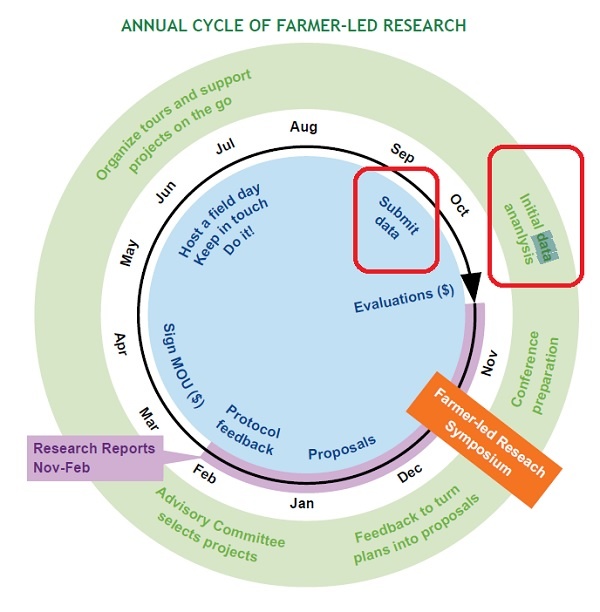Towards FARMER-led RESEARCH: a GUIDE to working together with Farmers in Research


The booklet Towards FARMER-led RESEARCH: a GUIDEBOOK - published (2018) by the Ecological Farmers Association of Ontario (EFAO) - aims to provide you with support to work together with farmers in research. |
In particular, this guide:
- synthesises literature on Farmer-Led Research from around the world, with a focus on the North American context, and shares EFAO’s experiences and lessons from the Farmer-led Research (FLR) programme open to all farmers interested in improving or adopting ecological practices on their farm;
- offers a practical tool for researchers and practitioners seeking to develop, implement and evaluate Farmer-Led Research Programmes.
FARMER-LED RESEARCH (FLR)…
According to the authors of the guidebook, FARMER-LED RESEARCH (FLR) |
EFAO's FLR programme puts the focus on being farmer-driven:
- from the formulation of research questions and design of the project,
- to data collection, all the way to data analysis and dissemination of results,
– to meet the diverse needs of different farmers. In this way, FLR leads to innovation, builds local capacity and supports livelihoods through better productivity, nutrition and household income.
The guide provides examples of the following organizations helping foster FLR:
Based on DATA, agricultural non-profit organizations like EFAO and PFI also focus on farmer-to-farmer knowledge generation and sharing. Through this approach, member-farmers are connected to the environment and each other. |
FLR… AND DATA: WHY DOES IT MATTER?
A cycle of the FLR Program begins with project design and planning in late fall and winter. The trials typically run during the growing season (May - October). In November, the previous season’s research reports are presented at the Farmer-led Research Symposium:

This FLR model/mentor programme is invaluable for advice and support
*** Farmers more than any other profession understand that each year is unique in its own way. Weather and many other unknowns (e.g. neighbour’s practice) often provide unexpected challenges to the farmer and farmer-led research. For this reason, farmer-researchers are called for more multi-year trials, because including multiple growing seasons increases the APPLICABILITY of the DATA.
*** Like multi-year trials, multiple farms researching the same question increases the APPLICABILITY of DATA and scope of the findings, especially for geographically diverse provinces.
*** In addition, multi-farm trials hold farmers socially accountable, knowing that other farmers depend on them to finish their project to the best of their ability and DELIVER DATA on time.
*** At the end of the trial season, farmers are supported in the CONSOLIDATION and ANALYSIS of their RESEARCH DATA. The FLR Program helps ensure that proper interpretation of results (i.e. statistical relevance and practical significance) is consistent, and helps farmers write and publish reports.
EFAO provides a diversity of capacity development, including how to formulate a research question, how to design a research protocol, training in statistics and DATA INTERPRETATION, and how to communicate and ‘tell your story’ based on data to others.
To learn more, you are invited to access and read the Towards FARMER-led RESEARCH GUIDEBOOK (24 pp., 2018)
DATA-RELATED:
Submit an ABSTRACT at the IGAD RDA 13th pre-meeting: 'AGRICULTURE DATA Interoperability: Opportunities and Lessons Learnt from Sharing and Re-Using Data' Deadline: 22 February 2019 |
The CODATA-RDA Research Data Science Summer School will take place on 5-16 August 2019. Apply here! Deadline: 18 April 2019. This school provides Early Career Researchers (at MSc-level to 3 years after their PhD) and Professionals (who register via ITU Academy) with the necessary set of foundational Data Science skills to enable them to analyse their data in an efficient and effective manner for the 21st century. The material covered here is fundamental to all areas of Data Science and hence open to researchers from all disciplines that deal with significant amounts of data. Individuals with a background in High Energy/Particle Physics, IoT/Big-Data Analytics, Bioinformatics and Climate Data Sciences can apply to one of the Advanced workshops that run immediately after the school. A limited number of grants are available to support the attendance of selected participants from developing countries. Professionals and corporate entities must register and apply via the ITU Academy platform. For more information from the ICTP site go to: http://indico.ictp.it/event/8706/ |
- From debate about FAIR and Open Data to greater exploratory research, constructive discussions and solutions based on interoperable data in the agri-food and related sectors (highlights of the RDA IGAD outputs/recommendations)
- FAOSTAT: Food and Agriculture data : provides free access to food and agriculture data for over 245 countries and territories and covers all FAO regional groupings from 1961 to the most recent year available
- Discover AGROVOC multilingual Thesaurus of the Food and Agriculture Organization of the UN (FAO)... in Numbers!
- Explore Virtual Research Environments of the D4Science.org Gateway
- Discover AGRIS: International System for AGRICULTURAL SCIENCE and TECHNOLOGY
- Developing Data Interoperability using standards: A Wheat Community use case
- The UN Biodiversity Lab : a scalable open-source Data platform to provide key information on the Aichi Biodiversity Targets and nature-based Sustainable Development Goals
- Open Agriculture Foundation | Google Cloud: creating healthier, more engaging, and more inventive food with technology
RESPONSIBLE DATA GUIDELINES: Managing Privacy and Personally Identifiable Information
- AgBioData ensures Standards and Best Practices for acquisition, display and retrieval of Genomic, Genetic & Breeding Data
Implement effective Open Data & Keep it alive with Open Data TOOLKIT
- Free E-learning Module: Finding Research Data
- Recorded ANDS FAIR Webinar series : #1 Findable #2 Accessible #3 Interoperable #4 Reusable
- Free Data Tree e-course
- Discover Free GODAN_Action E-LEARNING PROGRAMME on open data management is ongoing to help strengthen the capacity of data producers and data consumers to manage and use open data in agriculture and nutrition
- About The Global Nutrition Report and Open Data (recorded GODAN Action Webinar)
- DATA-DRIVEN AGRICULTURE (Recorded Webinars; GFAR / CTA / GODAN)
You are invited to Sign up for AIMS News, follow @AIMS_Community on Twitter... And, thanks again for your interest!

